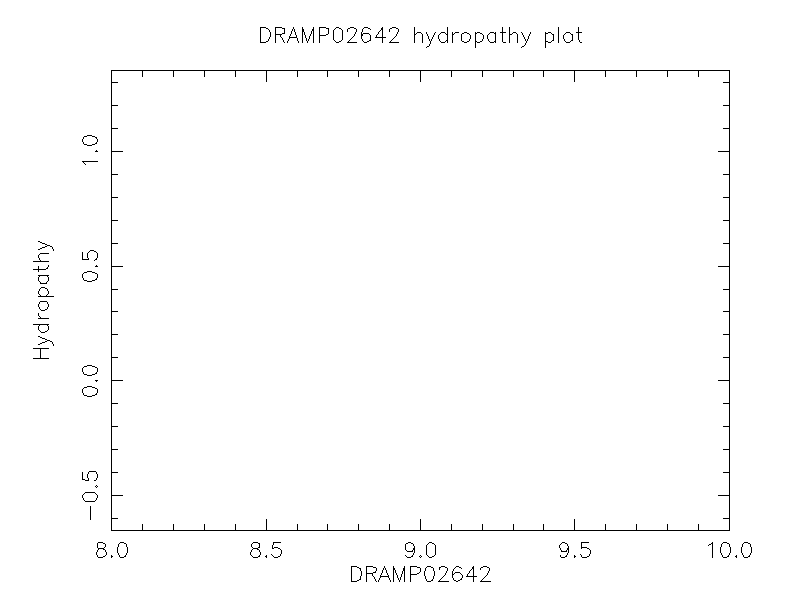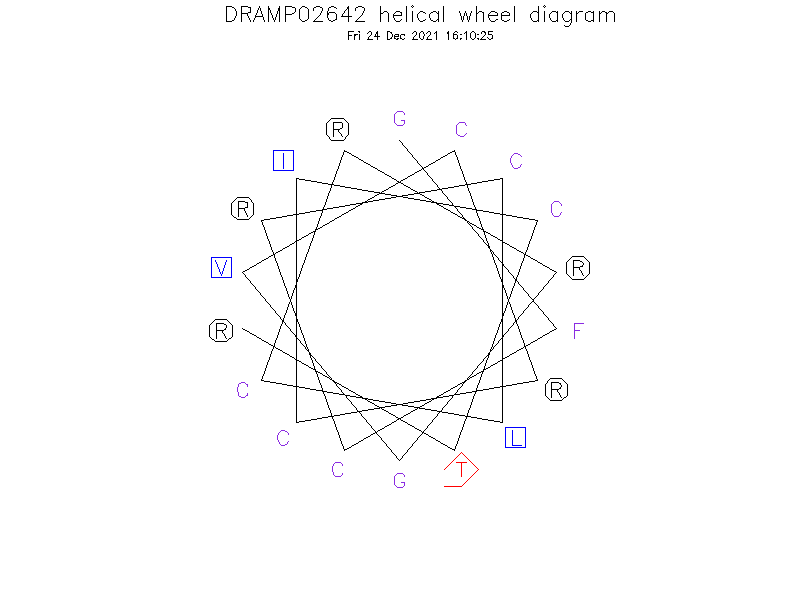General Information
-
DRAMP ID
- DRAMP02642
-
Peptide Name
- Rhesus theta-defensin 1 (RTD-1; primates, mammals, animals)
-
Source
- Macaca mulatta (Rhesus macaque)
-
Family
- Belongs to the alpha-defensin family (Theta subfamily)
-
Gene
- Not found
-
Sequence
- GFCRCLCRRGVCRCICTR
-
Sequence Length
- 18
-
Protein Existence
- Protein level
Activity Information
-
Biological Activity
- Antimicrobial, Antibacterial, Anti-Gram+, Anti-Gram-, Antifungal, Antiviral
-
Target Organism
-
- Gram-positive bacteria: Staphylococcus aureus 502a and Listeria monocytogenes;
- Gram-negative bacteria: Salmonella typhimurium, Escherichia coli ML35.
- Fungi: Candida albicans 16820, Cryptococcus neoformans 271A (the activity of RTD-2 against Escherichia coli ML35 was 2-3-fold less than those of RTD-1 and RTD-3).
-
Hemolytic Activity
-
- No hemolysis information or data found in the reference(s) presented in this entry
-
Cytotoxicity
- No cytotoxicity information found in the reference(s) presented
-
Binding Target
- Not found
Structure Information
-
Linear/Cyclic
- Cyclic
-
N-terminal Modification
- No specific N-terminal
-
C-terminal Modification
- No specific C-terminal
-
Nonterminal Modifications and Unusual Amino Acids
- Disulfide bonds between Cys3 and Cys16,Cys5 and Cys14,Cys7 and Cys12.
-
Stereochemistry
- L
-
Structure
- Beta strand (4 strands; 10 residues)
-
Structure Description
- Not found
-
Helical Wheel Diagram
-
PDB ID
- 1HVZ resolved by NMR.
-
Predicted Structure
- There is no predicted structure for DRAMP02642.
Physicochemical Information
-
Formula
- C82H145N33O20S6
Absent Amino Acids
- ADEHKMNPQSWY
Common Amino Acids
- C
Mass
- 2105.62
PI
- 9.3
Basic Residues
- 5
Acidic Residues
- 0
Hydrophobic Residues
- 4
Net Charge
- +5
-
Boman Index
- -50.75
Hydrophobicity
- 0.35
Aliphatic Index
- 59.44
Half Life
-
- Mammalian:30 hour
- Yeast:>20 hour
- E.coli:>10 hour
Extinction Coefficient Cystines
- 375
Absorbance 280nm
- 22.06
Polar Residues
- 9
DRAMP02642

Comments Information
Function
- RTD-1 and RTD-2 have similar antimicrobial activities against the Gram-positive bacteria S. aureus 502A and L. monocytogenes, the Gram-negative bacterium S. typhimurium, and the fungi C. albicans 16820 and C. neoformans 271A. RTD-2 is 2-3-fold less active than RTD-1 against E. coli ML35.
Subunit structure
- RTD-1 is a cyclic heterodimer composed of subunits A and B; disulfide-linked.
Tissue specificity
- RTD-1 is expressed in bone marrow. Detected in promyelocytes, myelocytes and mature neutrophils and monocytes.
Developmental stage
- RTD-1 expression begins early during granulocyte myelopoiesis.
PTM
- Forms a cyclic peptide with 1 subunit B (RTD-2) or with 1 subunit A (RTD-1). An additional intersubunit disulfide bond is formed.
Miscellaneous
- RTD-1 is 10-fold more present in cells than RTD-2.
Literature Information
- ·Literature 1
-
Title
- A cyclic antimicrobial peptide produced in primate leukocytes by the ligation of two truncated alpha-defensins.
-
Pubmed ID
- 10521339
-
Reference
- Science. 1999 Oct 15;286(5439):498-502.
-
Author
- Tang YQ, Yuan J, Osapay G, Osapay K, Tran D, Miller CJ, Ouellette AJ, Selsted ME.
- ·Literature 2
-
Title
- Circular minidefensins and posttranslational generation of molecular diversity.
-
Pubmed ID
- 1152799
-
Reference
- J Leukoc Biol. 2001 Sep;70(3):461-464.
-
Author
- Leonova L, Kokryakov VN, Aleshina G, Hong T, Nguyen T, Zhao C, Waring AJ, Lehrer RI.
- ·Literature 3
-
Title
- Homodimeric theta-defensins from rhesus macaque leukocytes: isolation, synthesis, antimicrobial activities, and bacterial binding properties of the cyclic peptides.
-
Pubmed ID
- 11675394
-
Reference
- J Biol Chem. 2002 Feb 1;277(5):3079-3084.
-
Author
- Tran D, Tran PA, Tang YQ, Yuan J, Cole T, Selsted ME.

